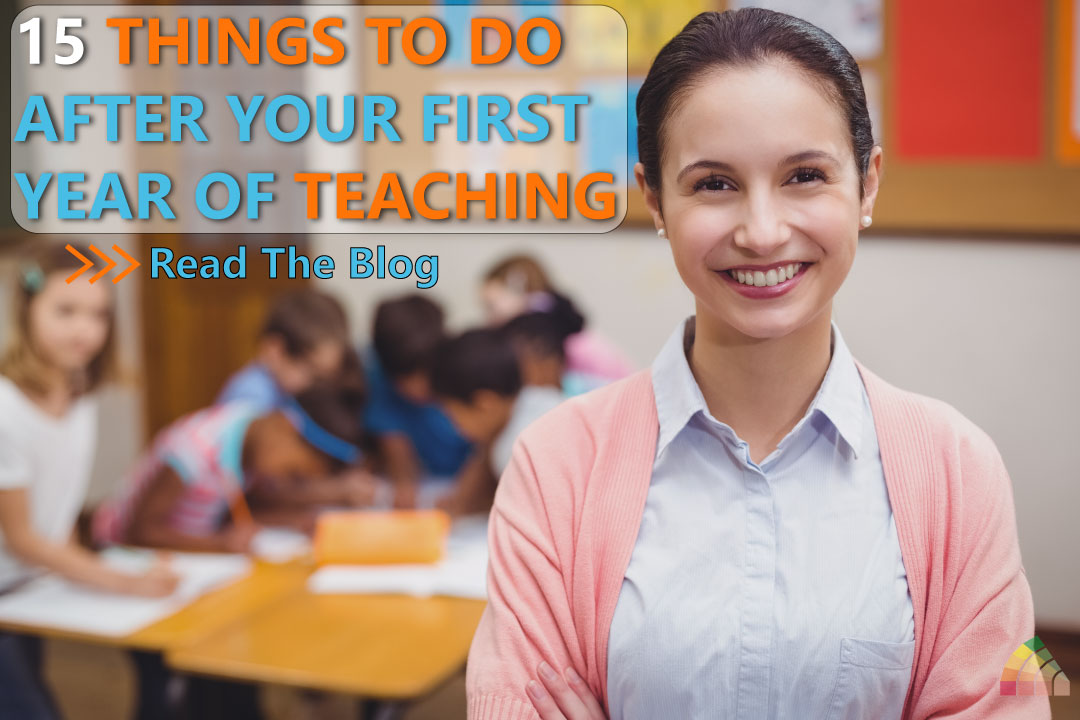It’s nearly time to trade your teacher bag in for a beach bag - summer’s almost here! If this was your first year teaching, here are a few tips to make you summer brighter and the beginning of your second year of teaching run more smoothly.

1) Record Success
Get a two-subject notebook. In the first section, think about all the things you loved most about this year. What went right? How would you like to expand that success into other areas? Can you recreate that success by using the same strategy in an area with which you struggled?
In the second section, record things that were less than spectacular. Be careful not to allow negativity to overwhelm you in this activity, though - just remember that even the most seasoned professionals have things they can improve upon and learn each year. Over the summer, after you’ve rested a bit, you’ll be able to brainstorm and problem-solve to navigate through troublesome areas more effectively.
Get a two-subject notebook. In the first section, think about all the things you loved most about this year. What went right? How would you like to expand that success into other areas? Can you recreate that success by using the same strategy in an area with which you struggled?
In the second section, record things that were less than spectacular. Be careful not to allow negativity to overwhelm you in this activity, though - just remember that even the most seasoned professionals have things they can improve upon and learn each year. Over the summer, after you’ve rested a bit, you’ll be able to brainstorm and problem-solve to navigate through troublesome areas more effectively.
2) Schedule Personal Appointments and Summer Professional Development Courses
Summer is famously the time for all teaching professionals to do everything else in life they’ve put off for the previous 9 months - medical and dental checkups, car repairs, home repairs - you name it. Try to call and schedule appointments as soon as you can, before summer begins, so that you can get in before the “teacher-rush”.
Professional Development summer courses are generally a district requirement. The quicker you register and claim your spot, the more likely you are to be able to choose the topics that really interest you.
Summer is famously the time for all teaching professionals to do everything else in life they’ve put off for the previous 9 months - medical and dental checkups, car repairs, home repairs - you name it. Try to call and schedule appointments as soon as you can, before summer begins, so that you can get in before the “teacher-rush”.
Professional Development summer courses are generally a district requirement. The quicker you register and claim your spot, the more likely you are to be able to choose the topics that really interest you.
3) Start Packing
This is a great time to clean out all the lockers, cubby holes, boxes, and cabinets you’ve been piling things in all year. Throw things away, give things away, and organize according to need throughout your year. Take note of all your changes before the actual end-of-the-year packing really begins.
Pro-tip! Many schools hand out a “checkout list” that tells you the things you are required to complete before leaving for the summer. If you’ll be returning to the same school next year, make a copy of this list and file the copy so that next year you can start working on it a bit earlier, if you choose to.
This is a great time to clean out all the lockers, cubby holes, boxes, and cabinets you’ve been piling things in all year. Throw things away, give things away, and organize according to need throughout your year. Take note of all your changes before the actual end-of-the-year packing really begins.
Pro-tip! Many schools hand out a “checkout list” that tells you the things you are required to complete before leaving for the summer. If you’ll be returning to the same school next year, make a copy of this list and file the copy so that next year you can start working on it a bit earlier, if you choose to.
4) Paperwork -
Even if you’ve neglected it all year, now is the time to keep up with that gradebook and paperwork! Get it done so it doesn’t get overwhelming later. Ask around and see what other paperwork may need to be done as the end of the year draws near. End of the year certificates and awards, documents needed to be completed or turned in, and the updating of files and records kept by the school are just a few of the end-of-the-year things for which you may be responsible.
5) Plan for Improvement -
Go back to that notebook for a brief glance - not to solve anything, but to pick three areas - and ONLY three - in which you want to improve before next year. Find books and resources on those topics for light reading and studying. Gather your supplies (and put them away until at least the third week of summer).
Even if you’ve neglected it all year, now is the time to keep up with that gradebook and paperwork! Get it done so it doesn’t get overwhelming later. Ask around and see what other paperwork may need to be done as the end of the year draws near. End of the year certificates and awards, documents needed to be completed or turned in, and the updating of files and records kept by the school are just a few of the end-of-the-year things for which you may be responsible.
5) Plan for Improvement -
Go back to that notebook for a brief glance - not to solve anything, but to pick three areas - and ONLY three - in which you want to improve before next year. Find books and resources on those topics for light reading and studying. Gather your supplies (and put them away until at least the third week of summer).

6) Continue Packing -
Now that things are more organized, it’s time to start collecting containers and decide where things will be stored over the summer months. Begin with packing things that you are finished with for the year, but remember to ask your administrators if your classroom will be used over the summer break for summer school or other classes. If your room will be used, there may be things (that were purchased by the school or district) that the visiting teacher will need.
You never have to leave your own personal things in your room over the summer, although many teachers leave most of their things at the school. Just remember that valuable, irreplaceable things can get lost or damaged in the classroom, and districts will not usually compensate for your lost items.
7) List Needed Resources
Mentally review your year and think of things you needed or wish you’d had during your year. Summer is a great time to shop around for bargains, browse yard sales, or make things to use in your classroom. Keep a list of things you need to buy, find, or craft. Jot down what you plan to use it for, and note roughly when in the year you will need it. That will help you organize your summer finds.
Now that things are more organized, it’s time to start collecting containers and decide where things will be stored over the summer months. Begin with packing things that you are finished with for the year, but remember to ask your administrators if your classroom will be used over the summer break for summer school or other classes. If your room will be used, there may be things (that were purchased by the school or district) that the visiting teacher will need.
You never have to leave your own personal things in your room over the summer, although many teachers leave most of their things at the school. Just remember that valuable, irreplaceable things can get lost or damaged in the classroom, and districts will not usually compensate for your lost items.
7) List Needed Resources
Mentally review your year and think of things you needed or wish you’d had during your year. Summer is a great time to shop around for bargains, browse yard sales, or make things to use in your classroom. Keep a list of things you need to buy, find, or craft. Jot down what you plan to use it for, and note roughly when in the year you will need it. That will help you organize your summer finds.

8) Copy and Laminate
If your school provides free copying and laminating, copy anything you may need the first two weeks of school and laminate all the things you plan to use to decorate before leaving for the summer. If your school doesn't provide free copying, I'd suggest BestValueCopy.com for price, quality and speed. That way, you know that no matter what the summer holds, you won’t have to worry about copying and cutting out yards of lamination the night before school starts. If there are activities and games you know you want to print or make and laminate, now is an excellent time to take care of those things as well, since you will likely have time to take care of that during the summer.
If your school provides free copying and laminating, copy anything you may need the first two weeks of school and laminate all the things you plan to use to decorate before leaving for the summer. If your school doesn't provide free copying, I'd suggest BestValueCopy.com for price, quality and speed. That way, you know that no matter what the summer holds, you won’t have to worry about copying and cutting out yards of lamination the night before school starts. If there are activities and games you know you want to print or make and laminate, now is an excellent time to take care of those things as well, since you will likely have time to take care of that during the summer.
9) FILE. No, really… file.
Don’t just take your entire “file pile” and shove it straight into the back of the filing cabinet. Label folders, organize in groups, and file the things you will use again. You will be grateful you did this at the beginning of the next school year.
Also, if your computer has files you’ve created, save them all in a personal place (personal computer, upload to a cloud accessible from home, etc…) in case you get a new computer or your computer is damaged during summer maintenance. Don’t take any chances that you may lose something you really need.
Keep all student records and portfolio materials for at least two years unless everything is digital and there are multiple digital copies available, especially if the student struggled academically or you suspect an issue may come up later (possible abuse, neglect, behavioral issues, etc…).
Don’t just take your entire “file pile” and shove it straight into the back of the filing cabinet. Label folders, organize in groups, and file the things you will use again. You will be grateful you did this at the beginning of the next school year.
Also, if your computer has files you’ve created, save them all in a personal place (personal computer, upload to a cloud accessible from home, etc…) in case you get a new computer or your computer is damaged during summer maintenance. Don’t take any chances that you may lose something you really need.
Keep all student records and portfolio materials for at least two years unless everything is digital and there are multiple digital copies available, especially if the student struggled academically or you suspect an issue may come up later (possible abuse, neglect, behavioral issues, etc…).

10) Throw or Give Things Away
Teachers, especially those who work in elementary, are notorious hoarders. Don’t be a hoarder! Throw away things you know you won’t use next year, or if you just can’t completely part with it, give it to someone else.
11) Breathe. Sleep. Eat.
Summer is a great time for rest and relaxation. Pamper yourself at every opportunity and try to schedule some time away from home. Even a small get-away to a nearby town or a few days camping will recharge your batteries and help you feel that you are “reset” to face new challenges next year.
Teachers, especially those who work in elementary, are notorious hoarders. Don’t be a hoarder! Throw away things you know you won’t use next year, or if you just can’t completely part with it, give it to someone else.
11) Breathe. Sleep. Eat.
Summer is a great time for rest and relaxation. Pamper yourself at every opportunity and try to schedule some time away from home. Even a small get-away to a nearby town or a few days camping will recharge your batteries and help you feel that you are “reset” to face new challenges next year.
12) Prep Students for Their Next Step
Your students are very likely to be thinking about next year, too, and no matter what age you teach, it’s very helpful to let them ask questions and talk to you and each other about what will happen next. Younger children won’t understand summer, let alone the next year, but talk with them about it anyway. After a week or so over the summer break, it will start to make sense to them.
Meet with next year’s teachers whenever possible. Talk about the future. Plan for graduation. Dream with them.
13) Review, Review, Review
Summarize the year with your students and remind them of all the things they learned. Set up tutoring to prevent summer setbacks for struggling students if you can and the service is available.
Your students are very likely to be thinking about next year, too, and no matter what age you teach, it’s very helpful to let them ask questions and talk to you and each other about what will happen next. Younger children won’t understand summer, let alone the next year, but talk with them about it anyway. After a week or so over the summer break, it will start to make sense to them.
Meet with next year’s teachers whenever possible. Talk about the future. Plan for graduation. Dream with them.
13) Review, Review, Review
Summarize the year with your students and remind them of all the things they learned. Set up tutoring to prevent summer setbacks for struggling students if you can and the service is available.
14) Enjoy the Last Few Weeks -
These are the weeks that make education the best job ever. Summer is amazing and wonderful, but the last three weeks are the best moments of life for a teacher. Take time to write letters to your students and their families, make contact provisions, and enjoy the connections you’ve made this year. Relive the best and worst memories you’ve made together this year as a class family. Take a picture with your classes and make sure you record their names in picture order, first and last, and record the date (if you don’t, after a few years, these things will fade from your memory even if you are certain you’ll never forget anything about your first class).
These are the weeks that make education the best job ever. Summer is amazing and wonderful, but the last three weeks are the best moments of life for a teacher. Take time to write letters to your students and their families, make contact provisions, and enjoy the connections you’ve made this year. Relive the best and worst memories you’ve made together this year as a class family. Take a picture with your classes and make sure you record their names in picture order, first and last, and record the date (if you don’t, after a few years, these things will fade from your memory even if you are certain you’ll never forget anything about your first class).
15) Let It All Go
Tell your students you love them - and mean it. Say goodbye to each one specifically. Saying a deep, heartfelt goodbye helps you find closure.
As you close up your classroom, hand in your keys, and say goodbye to other faculty and staff members, take a moment to let everything sink in. Whatever happened this year is over, good and bad. Take a moment to reflect, accept, and say goodbye to your first year.
Then close your classroom door, and walk away.
Tell your students you love them - and mean it. Say goodbye to each one specifically. Saying a deep, heartfelt goodbye helps you find closure.
As you close up your classroom, hand in your keys, and say goodbye to other faculty and staff members, take a moment to let everything sink in. Whatever happened this year is over, good and bad. Take a moment to reflect, accept, and say goodbye to your first year.
Then close your classroom door, and walk away.




 RSS Feed
RSS Feed
